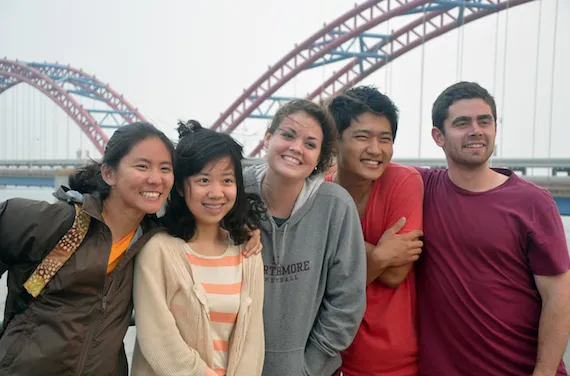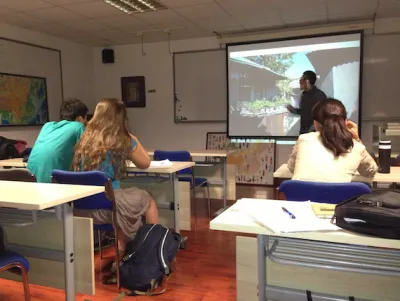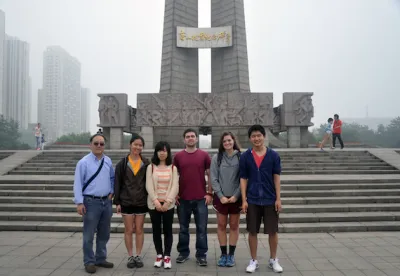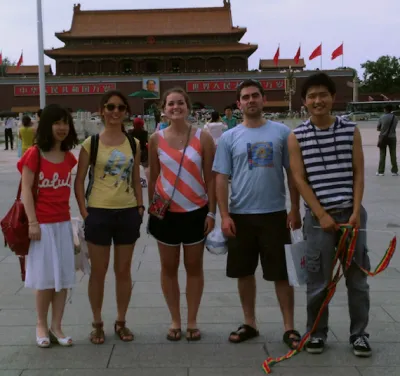Interdisciplinary. International.
For five students and their professors, one class last spring didn't end when the semester did.

From left, Emily Zhang '15, Chi Zhang '15, Liz Casey '14, Zhe Sun '15, and Collin Smith '14 took part in a field study in China as part of the interdisciplinary Governance and Environmental Issues in China course. Here, at the Jidong Oil Field in Bohai Bay. (All photos courtesy of Haili Kong)
After learning about China and the environment in class last semester, five students traveled to China this summer to continue their studies. Accompanied by their professors, they focused on finding answers to their questions about the country's energy sector, Internet censorship, and everything in-between.
The students - Chi Zhang '15, Collin Smith '14, Elizabeth Casey '14, Emily Zhang '15, and Zhe Sun '16 - were part of Governance and Environmental Issues in China. Co-taught by Professor and Chair of the Department of Modern Languages and Literatures Haili Kong and Professor of Political Science Tyrene White, the course was an interdisciplinary collaboration that used Chinese film and literature to complement instruction in Chinese politics and environmental issues.
The five students were chosen from among the 20 who took the class. From May 27 to June 15, they attended lectures and events, made site visits to areas of significance related to their studies, and continued pursuing research to supplement the individual projects they began on campus in the spring. Smith, for example, explored the Chinese renewable energy sector.
"It really was a mix between organized speakers and activities relating to what we covered in the class, and our own individual research projects," says Smith, an Honors political science major from New Hope, Pa.
White and Kong made sure the students' schedules were brimming with activities to help their students understand the complexities of the Chinese system of governance through first-hand experiences. Guest lecturers included Hamid Sharif, country director for the Asian Development Bank; Hengda Yang, professor and senior administrative adviser at the Beijing Center for Chinese Studies; and Zhenyao Wang, head of the Chinese Philanthropy Research Institute, among others.

Students listen to a lecture by Cui Jinze, curator of Art Exhibitions China, entitled “The Campaign for the Protection of the Former Residence of the Tutor of the Last Emperor in China.”
"We definitely met a lot of very interesting people working in all aspects of environmentalism, and it was very beneficial to speak to them about what their priorities are," says Zhang, an Honors double major in math and economics from Changsha, China.
The students weren't the only ones who reaped the benefits of their bustling schedules.
"For all of the times that I've been to China to do research, I've not had the experience of hopping across the city in a very short period of time from one kind of office to another," says White, an expert in contemporary Chinese politics and the author of China's Longest Campaign: Birth Planning in the People's Republic, 1949-2005 (Cornell, 2006).
"My very favorite part of the trip was getting to know the students better," she says, "and seeing them get excited about and make progress on their own projects."
The Governance and Environmental Issues in China course, and culminating field excursion, took considerable planning. White and Kong traveled to China in the summer of 2012 to explore options for student accommodations and to identify potential expert lectures, site visits, and other activities. Kong then returned to China in March to finalize the plans.
An Environmental Studies Course Development grant from the Mellon Foundation, as well as support from Elizabeth Economy '84, C.V. Starr Senior Fellow and Director for Asia Studies for the Council on Foreign Relations, made the trip possible.
Alumni living in China were also heavily involved in creating a successful experience for the students. Zhiyuan Zhu '04, chief counsel for the Tsinghua University International Energy and Environment Center, and Sabina Brady '79, an attorney, both arranged dinners for the group and offered their insights and expertise.
"Sabina graciously opened her home to us," says Kong, who has taught Chinese language, literature, and cinema at Swarthmore since 1994. "She gave students the unique opportunity to talk with an alumna who has lived in China since her graduation from Swarthmore and witnessed the profound changes and environmental consequences of rapid development."

The students with Professor of Chinese and Chair of the Modern Languages and Literatures Department Haili Kong (left).
In addition to a wide range of speakers, the students were exposed to an equally impressive diversity of workplaces - an environmental college for a private lecture, the apartment that was home base to a one-woman NGO, and an earthquake training shelter, to name a few.
"I think the most successful part [of the trip] was the extent to which we were able to engage," Smith says.
Zhang's work on the policies and models for green public transportation in China also led her to speak with experts at NGOs, as well as someone from a government think tank. Meanwhile, Casey's research on the impact of social media in the environmental sector brought her in close contact with college students, in addition to professors and NGO workers.
"It gave us a very broad range of perspectives on the environmental issues facing China today," adds Zhang.
Smith is appreciative of the exposure he gained in China, and knows another trip like this one will be hard to come by.
"We weren't just in a library at a college in a different country," he says. "We were actually going out and experiencing a different country."
Similarly, Casey was able to conduct research in the field and ran into censorship problems throughout the trip while attempting to conduct online research.
"[Professor White] said that I could include my own experiences dealing with the difficulties of Internet and censorship in my paper," she adds.
Given the daunting task of striking out on their own, White was extremely impressed by the students' ambition and diligence, particularly considering the sheer number of tasks they were asked to fulfill and the amount of information they were asked to process.
"They really worked extremely hard while they were there to both absorb what they were getting from the regular schedule and at the same time, do a lot of digging and researching online and emailing and calling, trying to talk to people and make connections," she says.

The success of this interdisciplinary effort has already spurred a sequel. Policies and Issues of Fresh Water Resources in China, a course and field study co-taught by Richter Professor of Political Science Carol Nackenoff and Assistant Professor of Chinese Lala Zuo, with contributions from Engineering Professor Art McGarity, will debut in the spring. Support for that course will come, in part, from the Luce Initiative on Asian Studies and the Environment.
White hopes this is the jumping off point for a vast expansion of field-study work outside of the classroom. She is not alone. This past summer, students in a directed reading offered by Black Studies, Blacks in the Diaspora, traveled to Brazil to continue their studies.
"I hope that we're going to see more of this, that students have more opportunities," White says. "I'm hopeful that it won't be just limited to that part of the world, that there will be more opportunities for students in general to be able to enroll in courses that include this kind of field study as a part of the class."
Many of those involved in the planning and execution of the Governance and Environmental Issues in China course and field study will present their findings on Sept. 23 at 4:30 p.m. in Kohlberg Hall's Scheuer Room, in a discussion called "Field Trip to Beijing: A Close-Up Look at China's Environmental Challenges."



